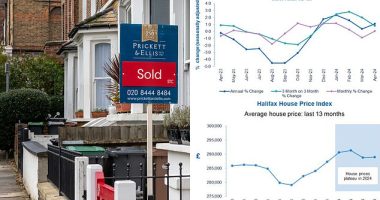HALF a million energy customers are facing bill rises of up to 300% due to a loophole in the price cap.
The energy price cap is meant to limit bill hikes for all households but some are being excluded and are losing any protection from soaring prices.
The energy price cap was launched in 2019 to support customers who come to the end of their contracts and are moved on to standard variable tariffs.
The cap limits how much these customers can be charged and is set by Ofgem each April and October.
Record wholesale gas prices have been pushing up energy bills since the end of 2021, which has pushed the cap up and means customers on these tariffs now pay more.
Ofgem increased its price cap from £1,138 to o £1,277 in October and more increases are predicted this April.
Consultancy Cornwall Insight has predicted the energy price cap could rise by an extra £600 in the coming months – doubling bills to more than £2,000.
The increased wholesale prices have also put pressure on smaller suppliers and almost 30 closed last year, reducing competition in the market.
Most residents are being told they are currently better off sticking with price cap tariffs due to a lack of competitive deals.
But energy experts are warning that households in blocks of flats or developments on shared heating systems are being left without the protection of the price cap as they are treated as commercial rather than domestic users.
This means they could be paying up to 300% more for their heating compared with most other residential users, according to but Ginger Energy – a consultancy that helps secure energy deals for apartment blocks.
Rather than paying up to £1,277 for their energy, these customers could end up with bills worth an extra £3,831 or £5,108 in total.
There are around 17,000 communal heat networks supplying almost 500,000 UK customers.
These customers can’t shop around as it is because the development-owner agrees the energy supplier and then recharges residents.
These block owners have a duty to find the best value rates but Ginger Energy warns that rising energy costs and the lack of a price cap means residents are missing out.
Lisa Gregory, director of Ginger Energy, said: “We are about to have to tell the residents of some blocks that they will be paying four times the previous unit charge for their energy.
“While normal residential consumers are protected – at least for a period – through the price cap, the consumers in these blocks are fully exposed to the market changes because they are classed as business users despite actually being domestic users.”
She warned that many residents may struggle to pay the new costs and will then get into debt.
Ginger Energy is calling for Ofgem to include these types of residents in the price cap and is urging property managers and consumer group The Heat Trust to support its campaign.
Gregory added: “In the current market commercial tariffs are up to 300% higher. How would your behaviour at home or business change if your electricity bill went up 300% overnight?
“Sadly, some residents don’t understand the gravity of what’s happening. It’s only when they receive the first bill they realise.
“While we know of others among our industry who don’t consider the price cap fit for purpose, we want to go further and urgently highlight how many communal supply residential customers are not covered by the cap.”
A statement from Ofgem said: “Higher energy bills are never welcome and any customer worried about bills should contact their supplier to access available support.
“Ofgem’s remit does not currently include regulating heat networks, however the government has set out proposals to regulate the sector, including appointing Ofgem the regulator for heat networks.
“This will ensure heat network customers, especially those in vulnerable circumstances, receive a fair price and reliable supply of heat for their homes as we make the transition to net zero.”
What help can you get if you are struggling with energy bills?
It may be harder to shop around for cheaper energy bills at the moment but there is still support available.
Eligible pensioners can receive annual one-off winter fuel payments from the government of between £100 and £300.
When the temperature drops below zero in your area between November and March, you could be entitled to £25 a week in cold weather payments.
The temperature will have to stay this low for seven consecutive days before the payment is handed out.
What to do if you can’t pay your bills
FALLING behind on your energy bills can be extremely stressful.
If you’re struggling to pay what you owe, contact your supplier as soon as possible.
Your provider has to help you come up with a solution, and you should be able to negotiate a deal that works for you both.
One option is to agree a payment plan where you pay off your debts in affordable instalments.
You may be able to pay off your debts directly from your benefits through the Fuel Direct Scheme.
A fixed amount will automatically be taken to cover what you owe plus your usage.
To be eligible, you must be getting one of the following benefits:
- Income-based jobseeker’s allowance
- Income support
- income-related employment and support allowance
- Pension credit
- Universal Credit (but only if you’re not working)
If you cannot come to an agreement with your supplier, they may try to force you to get a prepayment meter installed.
In very rare cases, where you refuse to negotiate, your supplier might threaten you with disconnection.
You must receive specific benefits to qualify, including pension credit, income support, jobseeker’s allowance, income-related employment and support allowance, and Universal Credit.
Households on pension credit or low incomes may also qualify for the warm home discount scheme.
This is a one-off £140 payment which is designed to help with the cost of your electricity bill through winter.
You may be able to get the discount on your gas bill instead if your supplier provides you with both gas and electricity.
It’s not paid to you, instead it’s a one-off discount on your bill for the period between September and March.










